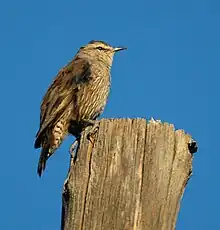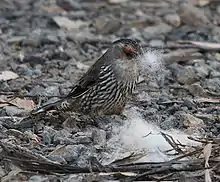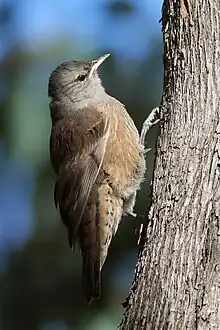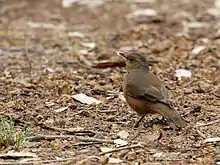Climacteris
Climacteris is a genus of bird in the family Climacteridae. These birds and the other members of the family, genus Cormobates, are similar to Northern Hemisphere creepers, Certhiidae, in climbing helically up tree trunks looking for insect food. Differences from Cormobates are
- Climacteris species have black, slightly downcurved bills.
- They have a rusty chest stripe in the female. (In Cormobates the female is marked on the face.)
- They have simple vocal repertoires that are the same for both sexes.
- They lay heavily marked pinkish eggs (Simpson and Day 1999).
- They are cooperative breeders; male offspring of previous broods and sometimes other individuals help breeding pairs (Doerr 2003).
| Climacteris | |
|---|---|
 | |
| Brown treecreeper (Climacteris picumnus) | |
| Scientific classification | |
| Domain: | Eukaryota |
| Kingdom: | Animalia |
| Phylum: | Chordata |
| Clade: | Dinosauria |
| Class: | Aves |
| Order: | Passeriformes |
| Family: | Climacteridae |
| Genus: | Climacteris Temminck, 1820 |
| Type species | |
| Climacteris picumnus[1] Temminck, 1824 | |
| Synonyms | |
|
Whitlocka G. M. Mathews, 1912. | |
It contains the following species:
| Image | Scientific name | Common Name | Distribution |
|---|---|---|---|
.jpg.webp) | Climacteris affinis | White-browed treecreeper | Australia. |
 | Climacteris erythrops | Red-browed treecreeper | Australia |
 | Climacteris picumnus | Brown treecreeper | Cape York, Queensland, throughout New South Wales and Victoria to Port Augusta and the Flinders Ranges, South Australia |
| Climacteris melanurus | Black-tailed treecreeper | north and northwestern Australia | |
 | Climacteris rufus | Rufous treecreeper | Australia. |
The Australian author G. M. Mathews published new generic names in 1912, based on characteristics that distinguished two species from this genus,
- Whitlocka, to describe the black-tailed northwestern species, Climacteris melanurus. The generic epithet honoured the ornithologist F. Lawson Whitlock.[2]
- Neoclima, assigning the species Climacteris picumnus, brown treecreeper, of Temminck as the type.[3]
References
- "Climacteridae". aviansystematics.org. The Trust for Avian Systematics. Retrieved 2023-07-16.
- whitlocka Jobling, J. A. (2018). Key to Scientific Names in Ornithology. In: del Hoyo, J., Elliott, A., Sargatal, J., Christie, D.A. & de Juana, E. (eds.) (2018). Handbook of the Birds of the World Alive. Lynx Edicions, Barcelona. (retrieved from www.hbw.com on 21 July 2018).
- neoclima Jobling, J. A. (2018). Key to Scientific Names in Ornithology. In: del Hoyo, J., Elliott, A., Sargatal, J., Christie, D.A. & de Juana, E. (eds.) (2018). Handbook of the Birds of the World Alive. Lynx Edicions, Barcelona. (retrieved from www.hbw.com on 21 July 2018).
- Doerr, V. A. J. (2003). "Australasian Treecreepers (Climacteridae)". In Christopher Perrins (ed.). The New Encyclopedia of Birds. Oxford University Press. ISBN 0-19-852506-0.
- Peterson, Alan P. (Editor). 1999. Zoological Nomenclature Resource (Zoonomen). Accessed 2007-08-30.
- Simpson, Ken; Day, Nicolas (1999). Birds of Australia. Princeton University Press. pp. 369–370. ISBN 0-691-04995-5. Retrieved 2007-08-30.
This article is issued from Wikipedia. The text is licensed under Creative Commons - Attribution - Sharealike. Additional terms may apply for the media files.